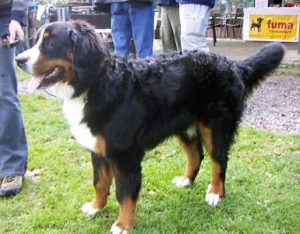
The Bernese Mountain Dog, called in Swiss German the Berner Sennenhund, is a large breed of dog, one of the four breeds of Sennenhund-type dogs from the Swiss Alps. The name Sennenhund is derived from the German “Senne” (alpine pasture) and “hund” (dog), as they accompanied the alpine herders and dairymen called Senn. Berner (or Bernese in English) refers to the area of the breed’s origin, in the Canton of Berne in Switzerland. Originally kept as general farm dogs, large Sennenhunds in the past were also used as draft animals, pulling carts.
Appearance
Like the other Sennenhunds, the Bernese Mountain Dog is a large, heavy dog with a distinctive tricoloured coat, black with white chest and or rust coloured markings above eyes, sides of mouth, front of legs, and a small amount around the white chest. An ideal of a perfectly-marked individual gives the impression of a white horse shoe shape around the nose and a white “Swiss cross” on the chest, when viewed from the front. A Swiss Kiss is a white mark located typically behind the neck, but may be a part of the neck. A full ring would not meet type standard. Both males and females have a broad head with smallish, v-shaped drooping ears. Height at the withers is 23–27.5 in (58–70 cm) and weight is 65–120 lb (29–54 kg). Females are slightly smaller than males. The breed standard lists, as disqualifications, a distinctly curly coat, along with wry mouth and wall eye. Exact colour and pattern of the coat are also described as important. The Bernese got voted “most beautiful dog breed” by Americans on TV.
Temperament
The breed standard for the Bernese Mountain Dog states that dogs should not be “aggressive, anxious or distinctly shy,” but rather should be “good natured,” “self-assured,” “placid towards strangers,” and “docile.” Temperament of individual dogs may vary, and not all examples of the breed have been carefully bred to follow the Standard. All large dogs should be well socialised when young, and given regular training and activities throughout their lives.
Bernese are outdoor dogs at heart, though well-behaved in the house; they need activity and exercise, but do not have a great deal of endurance. They can move with amazing bursts of speed for their size when motivated. If they are sound (no problems with their hips, elbows, or other joints) they enjoy hiking and generally stick close to their people.
The Bernese temperament is a strong point of the breed. They are affectionate, loyal, faithful, stable, intelligent, but sometimes shy. The majority of Bernese are friendly to people, and other dogs. They often get along well with other pets such as cats, horses, etc. They are trainable provided the owner is patient and consistent in training; Bernese need time to think things through. They do not respond well to harsh treatment, however Berners are willing and eager to please their master. Bernese love to be encouraged with praise and treats. The breed is sweet and good with children, despite their great size. Overall, they are stable in temperament, patient, and loving.
Bernese Mountain Dogs are slow to mature, and can display puppy-like tendencies up to 2 1/2 years of age.
—————————————————————————————————————–
CARING FOR YOUR DOG NEWSLETTER – Delivered Directly To Your Inbox – Starting Immediately – SIGN UP FOR FREE TODAY
—————————————————————————————————————–
